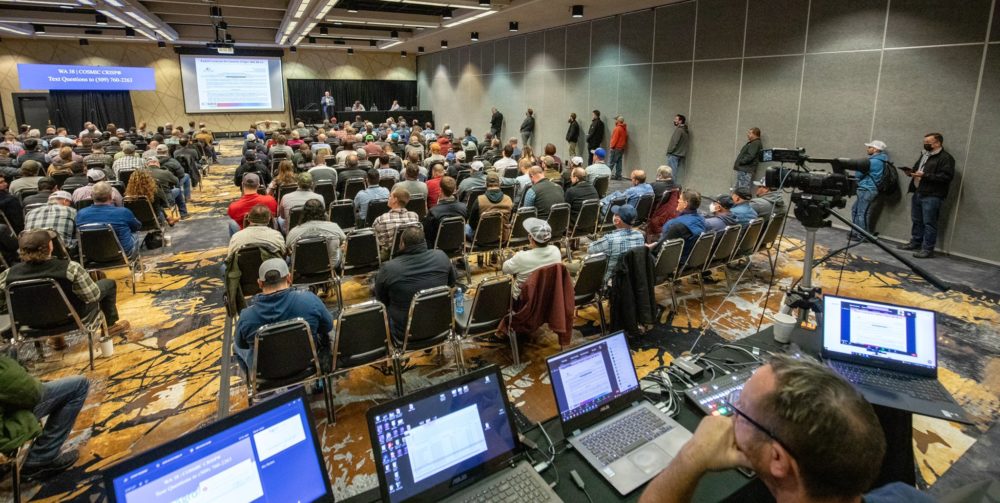The very last presentation of the Washington State Tree Fruit Association Annual Meeting packed the biggest punch.
In front of a packed Yakima conference room, Mike Robinson of Double Diamond Fruit in Quincy leveled criticism at the WA 38, Washington State University’s new apple marketed as the Cosmic Crisp.
The biggest beef for Robinson, one of three grower panelists who wrapped up a session all about the variety, is that Washington growers who have invested nearly $600 million in developing and planting have little control over marketing and packaging decisions, trademark use and who gets to plant it and where.

“The contract doesn’t guarantee a thing,” said Robinson, the Good Fruit Grower of the Year.
Meanwhile, the trees don’t have all the horticultural traits growers were sold, Robinson said. He suspects the WA 38 is more similar to Fuji than the Red Delicious it was supposed to replace, he said. It tip bears, produces large fruit, has a tendency to alternate bear and others, he said. He also sees similarities in WA 38 projected volume grown and the historical growth of Fujis. Fujis started out fetching more than $40 per box in the 1990s — which would be over $80 per box today — but that price dipped over time.
In his final slide, Robinson suggested a few “fantasy solutions,” including:
—Renegotiate royalties. Growers now pay $1 per tree and 4.75 percent of every box sold.
—Stop planting more trees until the market catches up with the ones already planted.
—Washington Tree Fruit Research Commission should negotiate for more control on future varieties or projects they fund. Since the 1990s, the commission has invested $5.5 million to develop WSU’s apple breeding program and fund research that supports the WA 38 and other cultivars.
Dave Gleason of Domex Superfresh Growers and Garrett Grubbs of Chelan Fruit were the other two growers on the panel.
Gleason asked the industry to work together to pool information about the variety quickly, which is happening in places, he noted.
“We don’t have a lot of time to figure it out to get it right,” said Gleason, the industry’s 2021 Silver Apple Award winner. Growers are expected to rapidly ramp up production of WA 38 as trees mature.
He suggested growers investing heavily in the WA 38 make backup plans, he said.
Grubbs shared some good news about the apple’s performance at three Chelan Fruit orchards. Most notably, quality has been spot-on in the company’s oldest WA 38 block, planted in 2018. The size range is 80–88, which fetches among the highest prices per box, according to the variety manager, and an average packout of over 90 percent.
That seems to support promises by WSU researchers that horticultural challenges, such as greasiness and green spot, will ease as the trees mature, he said.
“Everything they’ve said is going to happen is happening,” Grubbs said after the meeting in a follow-up interview.
The session also featured updates about royalties and brand enforcement from WSU officials, summations of research from WSU faculty, and production and commercialization information from staff at Proprietary Variety Management, or PVM, the Yakima company hired by WSU to manage the apple’s global rollout.
Lee Kalcsits of WSU showed evidence that green spot, a disorder causing green rings on fruit, becomes milder as trees age and can be mitigated by crop load, vigor and nitrogen management. Researchers believe it is a nutrient balance issue and are doing projects to find connections to calcium and potassium, which cause nutrient disorders in Honeycrisp, one of WA 38’s parents.
Stefano Musacchi of WSU discussed highlights of eight years of research into the WA 38, including a new study that involves wrapping the apples in paper bags. That seemed to decrease green spot incidence, though it would be too expensive as a commercial mitigation tool, he said. He intends to explore further in that vein.
Also from WSU, Sara Serra discussed pollination research, and Carolina Torres shared findings of greasiness studies.
Kevin Brandt, vice-president and chief operations officer of PVM, said the Cosmic Crisp carries the highest retail price at $2.67 per pound in stores, higher than Honeycrisp at $2.46, according to Nielsen data.
However, the average box price at the point of shipping was $46.88 for the 2020–21 marketing season, according to Idyia, a database PVM built to track statistics of the WA 38. That’s below the $55 per box that WSU uses in many of its royalty projections.
Sizes 80, 88 and 100 fetch the highest per-box prices.






I have a small orchard in western New York State. When will this tree be available for private use?
Thanks for the question, Debra. In North America, growers outside Washington must wait until at least 2027 to plant WA 38 trees.